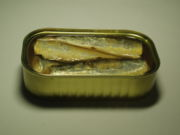Crime, punishment, and fish oils
 Research on criminals in Britain and the U.S. suggests that a lack of omega-3 fatty acids in the modern diet contributes to impulsive and violent behaviour.
Research on criminals in Britain and the U.S. suggests that a lack of omega-3 fatty acids in the modern diet contributes to impulsive and violent behaviour.In a trial at Aylesbury jail in the UK, violence declined by 37% when the inmates were fed multivitamins, minerals and essential fatty acids. A study conducted by the U.S. National Institute on Alcohol Abuse and Alcoholism on 30 patients with violent records found that those given omega-3 supplements had their anger reduced by a third.
The idea behind the tests is that modern diets are changing the way the brain works. This shouldn't be surprising. We have long known that diet can affect the behaviour of other organs, such as the heart, so why not the thinking organ? The brain is very fatty and the type of fat can significantly affect its performance. Nerve cell membranes tend to function more effectively when derived from omega-3 fatty acids than when derived from omega-6 fatty acids. Unfortunately, over the last century Western diets have shifted dramatically from omega-3s to omega-6s which come largely from industrial frying. The Japanese, who eat a diet rich in fish, a good source of omega-3s, have low rates of depression and murder.
The scientists are not suggesting diet alone creates criminals. They are saying it could be a significant factor. It is research like this, that gets at the root causes of crime, that holds the most promise of reducing crime, not tougher sentences and more prisons.







0 Comments:
Post a Comment
<< Home